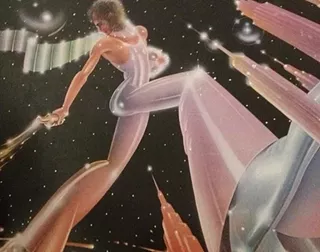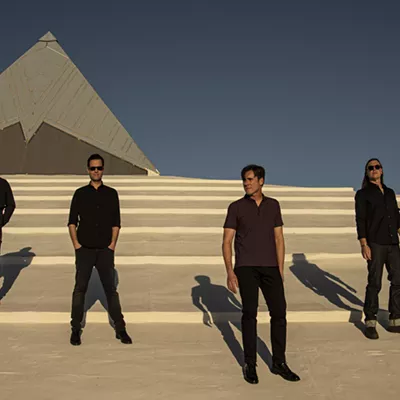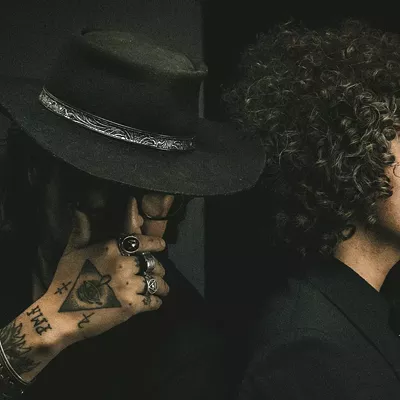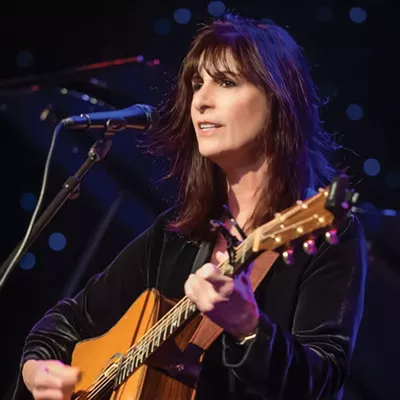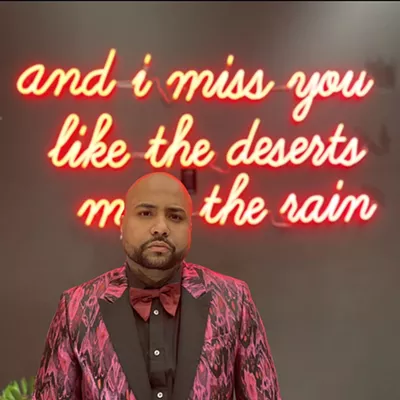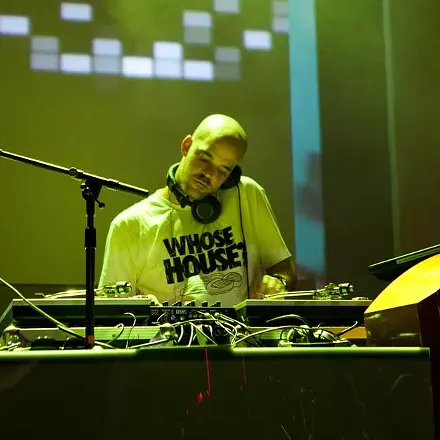Spoon is a band from Austin, Texas. Led by Britt Daniel, the group releases music that is bouncy, sleek and famously clipped.
White Rabbits is a band from New York (by way of Columbia, Mo.). Led (mostly) by Stephen Patterson, the band recently released its sophomore album, It's Frightening (TBD Records), a collection of jittery, lush music—famously produced by Britt Daniel.
Daniel—the musical elephant in the room—is pulling headlines, because It's Frightening boasts some Spoon hallmarks—studio chatter, abbreviated rhythms—but the real storyline is the album itself: It's a dense, masterful work.
White Rabbits could be one of the countless indie acts gracing the recent musical landscape. In 2007, they released an enjoyable album of anxious tunes, Fort Nightly; received a splash of critical acclaim; earned a late-night television appearance; and put together some nice touring credentials (including gigs with kindred spirits the Walkmen and Spoon). It's a pattern that has been spun out endlessly in our hyperkinetic musical age.
Yet, It's Frightening is something else, the kind of mature, monumental release that succeeds where many sophomore releases fail. The album opens with the brilliant "Percussion Gun," a song of militant drums, prickly descending guitar lines, abused piano and Patterson's throaty vocal outbursts. It closes with the tempered lullaby "Leave It at the Door." In between is a thrifty album of atmospheric piano ("They Done Wrong / We Done Wrong"), sparkling guitar ("Company I Keep") and clattery drumming ("Lionesse"). Lyrically, the album ranges from alienated and resigned to successful and dominant, without venturing into the maudlin or obnoxious. Coated in Daniel's rich production, It's Frightening is a headphone treasure.
Like New York's the Walkmen or Selkirk, Scotland's Frightened Rabbit, White Rabbits make music that sounds as if it may have been performed drunk; it leans heavily on vintage equipment played in a communal live setting, often imprecisely.
Speaking by phone, lead vocalist/pianist Patterson explained how he and his bandmates—vocalist/guitarist Gregory Roberts, guitarist Alexander Even, bassist Adam Russell and drummers Matthew Clark and Jamie Levinson—ventured from the college town of Columbia to New York, where they played together in their loft (and around town) before recording Fort Nightly.
Musically, the leap from Fort Nightly to It's Frightening is astounding. The linear, energetic bustle of the music on the former is beset by the abruptness—even disruptiveness—and stinging aggressiveness of the songs on the latter.
"I'd say it was natural band maturation," Patterson said. "You're not thinking about the grand scheme of things while you're in the process of writing a song, or even a batch of songs. These things just happen, and they just come out of thin air, and whenever it comes, you just go for it."
Certain ebullient elements and moments of levity found on Fort Nightly were excised, to focus on crafting better, stronger songs for the haunting, cutting It's Frightening.
"We're not worried about bringing in any tropical, or calypso, or any of that bullshit anymore; we're just focusing on writing good songs," Patterson said. "That would be the biggest difference. It was never a thought-out shift, to be honest; it was just what happened. I can understand why people think it's a departure. I don't. It still sounds like the same band to me."
Those "people" are likely the critics focusing on Daniel's influence over It's Frightening. The band knew the addition of a high-profile producer, along with the unexpected critical adulation for Fort Nightly, would put additional pressure on the recording of their album.
"I think for (It's Frightening), it was an adjustment for us: having to write with there being any expectations at all," Patterson said. "Britt really helped us get back to not caring anymore, and really encouraged us to take a bunch of risks and just be as wild as we could be."
Borrowing a page from music history, White Rabbits started taking risks when they opted to have a fellow musician, not a traditional producer, work on It's Frightening.
"We're all really into the idea of having a fellow musician and friend produce a record, as opposed to a record producer—a guy who produces records as a career," Patterson said. "I've always personally been fascinated by Elvis Costello producing the first Specials record, or David Bowie producing Iggy Pop. It makes listening to those albums really enjoyable and gives them another layer."
Still, Daniel was not timid in the booth and played the role of a stern critic. He often demanded the band members to venture from their comfort zone.
"He would definitely push us. And he was very opinionated with what we would do," Patterson said. "He would put his foot down, but he'd always let us have the final decision on what we wanted to do. There were a couple of songs we sent him, and he was like, 'Guys, this isn't good enough.' ... He definitely brought some things out of us we didn't know we had, and got us out of some old, bad habits."
It's a question mark what all this tutoring will do for White Rabbits' performances; live, they are a primal, visceral act—the evidence can be seen in the band's recent, crackling, raw take of "Percussion Gun" on Letterman. Nevertheless, the band has referred to the four-week-long recording of It's Frightening as "summer camp," which helps explain why Patterson currently favors the studio over the road.
"Right now, today, I prefer the recording process, and that's mainly because we had such a good time recording this record," Patterson said. "So, ask me in a month, whenever we're having a really good time on the road, and I might say the opposite."
Patterson does admit, for the moment, that being a musician has yet to bore him: "What always gets me really excited is hearing what you've created coming out of the speakers, and it's always a thrill, and it never gets old."

